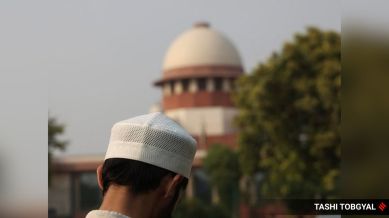Stay updated with the latest - Click here to follow us on Instagram
Waqf: Petitioners counter govt’s stand, Supreme Court reserves order
The petitioners sought interim relief on three primary grounds: “waqf by courts, waqf-by-user or waqf by deed”.

The Supreme Court on Thursday reserved its decision on the prayer for interim directions on petitions challenging the constitutional validity of the Waqf (Amendment) Act, 2025.
During the hearing before a bench comprising Chief Justice of India B R Gavai and Justice A G Masih, the petitioners countered the Centre’s stand that “waqf by user” was not an essential practice of Islam, while those favouring the amendments claimed that “waqf by user” had been misused to claim government land, entire villages and even temples which predate Islam.
monthly limit of free stories.
with an Express account.
Appearing for a petitioner, Senior Advocate Rajeev Dhawan submitted that the report of the Joint Committee of Parliament on Waqf (Amendment) Bill had said that “…the practice of waqf is more directly derived from Hadiths”.
“So this is essential (practice). The JPC (parliamentary panel) didn’t doubt it. I don’t know why the Union of India now doubts it,” he said.
Dhawan said the Centre’s counter-affidavit states that “creating a waqf endowment for religious and charitable purposes is indeed a practice encouraged by Islam. Then they make an averment that charity in itself cannot be an essential practice. This runs counter to their own counter and JPC”.
The senior counsel said the SC, too, had in the past said that waqf is an institution which is close to the heart of the Muslim community and that it is interwoven with their entire religious life and social economy.
“This is not a distinction between religion and charity. They are all parts of the pillar of Islam,” Dhawan said. That “particular argument” that waqf is not an essential practice of Islam “was designed to disentitle us to Article 25 and 26. That’s the sole purpose of the argument,” he said.
Appearing for the Centre, SG Tushar Mehta referred to section 3E that bars creation of waqf in respect of Scheduled Tribe areas.
To a query from the bench, the SG said the creation of waqf is irreversible and this would work against the interests of vulnerable tribals.
He pointed out that the JPC had said that “tribals may follow Islam but they have their separate cultural identity”.
Justice Masih, however, did not agree and said, “Does not appear to be correct. Islam is Islam. Religion is same.”
Mehta said there are state laws which restrict purchase of trial land.
On the Act saying that those wanting to create a waqf must have practised Islam for 5 years, the senior law officer pointed out that even the Muslim Personal Law (Shariat Application) Act required persons to make a declaration regarding their practice of religion. He added the condition was not in any manner to defeat the rightful claims of any person.
Senior Advocate Rakesh Dwivedi backed Mehta’s argument that waqf is not a core aspect of Islamic religion.
He said, “This concept (of waqf) was introduced, for the first time, in the Indian soil by the Privy Council judgment… This concept was introduced by means of law of prescription, not as an Islamic principle.”
Referring to Privy Council judgment which arose from a matter in Punjab in 1907 and in 1913, he said, “Lordships agree with the chief court in thinking that the land in suit forms part of a graveyard set apart for the Musalman community and that by user, if not by dedication, the land is waqf. So there is no dedication. Waqf is by permanent dedication under Islam. But they brought in the principle of user by one sentence. There is no discussion at all about any Islamic principle supporting waqf by user.”
Dwivedi said, “Outside the Indian subcontinent, this concept doesn’t exist. It is in India that it was introduced as a principle of adverse possession.”
Advocate G Priyadharshini, appearing for an intervenor, a Tamil Nadu resident, said his entire village, including a Chola-era temple predating Islam, had been claimed by waqf.
Senior Advocate A M Singhvi also representing a petitioner challenging the Act said the fundamental fallacy of the Centre’s argument is that it says the law gave the right to create waqf by user and the law took it away. “It’s like the Biblical dictum – the Lord granted, the Lord takes away. Unfortunately, laws can’t act like the Lord.”
“Your Lordships’ basic jurisprudence is that legislation does not create waqf by user. Cannot. It recognises waqf by user. Therefore, the law cannot take away what it has not created, but only recognised,” Singhvi said.
Senior Advocate Kapil Sibal, who appeared for a petitioner, said that as per the Act, waqf-by-user, even if registered, will not be a waqf if there is a dispute regarding its ownership or if it is a government property. This, he contended, would mean that all waqf-by-user properties will not be recognised without the determination of the dispute.
CJI Gavai pointed out that requirement for registration is not something new added by the 2025 amendment. “We have seen the Acts from 1923. You are right technically that in 1923, there was no provision for registration. But information about the waqf had to be provided. Continuously from 1954, registration was required,” he said.